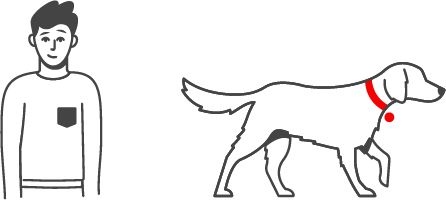Should I feed my dog homemade dog food?
Article

Increasingly, homemade dog food is being considered by pet owners hoping to provide dogs with a more varied diet and a wider set of flavours. But while homemade dog treats and meals often feel satisfying to make, the risks of producing your own dog food can outweigh any perceived benefits. Pet food needs to be very carefully created, including a precisely balanced mix of nutrients.
The purpose of daily nutrients for dogs
According to the Pet Food Institute, there are more than 40 nutrients your dog needs every day to remain healthy.1 Each of these must be precisely balanced as too little or too much of a single nutrient can lead to malnutrition and poor health. The essential nutrients in your dog’s daily diet affect every part of their health as they:
A balanced nutritional formula
Essential nutrients fall into one of six families, which all play a vital role in your dog’s ongoing health:
Protein
Protein is needed for muscle mass maintenance and is an essential source of amino acids, dogs require plenty of protein. Usually, this comes from meat, fish, eggs, dairy or vegetable sources.
Fats
Vegetable oils and special fish oils, as well as meat proteins, can provide the lipids, or fats, your dog needs for healthy bodily functions, building cells and the absorption of vitamins.
Carbohydrates
Carbohydrates are a source of energy and allow other calorie-containing nutrients to be used elsewhere, such as protein for muscle mass maintenance. While they’re not essential, it’s recommended to include other carbohydrates such as fibre in a dog's meal to aid their digestive tract.
Minerals and vitamins
Fresh ingredients lack certain vitamins and minerals, so a specialised veterinary supplement could be required to cover the remaining essential nutrients. Meat, for example, has a low level of calcium but does have a high level of phosphorus. It's important to make sure this is precisely formulated, as any inaccuracies may cause bone issues for your dog.
Water
Water is a major constituent of an animal's body. Fresh, clean drinking water should always be on hand for your dog to prevent dehydration. Water is key to the regulation of body temperature, intestinal mobility and dispersion of nutrients and waste in the body.
The measurement of each nutrient is determined by factors such as age, breed, weight, lifestyle, sensitivities and health conditions, and will change over the course of a pet’s life.
Even a healthy, adult dog can experience multiple alterations in their nutritional needs, due to changing activity levels, whether they’re carrying a litter, or even depending on their home setting. Dogs who live in an urban environment, for example, may have different needs to pets in more rural areas.
Can you make your own dog food?
Making your own dog food can be incredibly complex. Before you even start to make changes to your pet’s diet, it's important to consult with a veterinary nutritionist, who will calculate your dog's energy and nutrient requirements. Your dog's breed, age, weight, activity level, condition, health and living conditions will all be taken into account when developing your pet’s nutritional profile, and each nutrient must be met precisely.

Once your pet’s nutritional requirements are determined and you are given a formulated diet by a veterinary nutritionist, you will need to invest in specialist equipment. This can include, but is not limited to, a high-end meat grinder, cleavers, knives, shears, bowls, scales, containers, gloves, and cutting boards. Strict hygiene standards must also be met throughout the preparation process to avoid bacterial contamination.
Selecting the right ingredients to provide each nutrient can be difficult, too. Your veterinary nutritionist will select specific ingredients so your dog gets each nutrient in the proper amount. Some ingredients that seem nutritious to us can be toxic for your dog. Onions, for example, are a great source of vitamins and potassium, both of which are important nutrients families for pets, but are in fact toxic to dogs in any form.
Even with safe ingredients for dogs, those who are not used to making pet food are likely to find it difficult to extract the right nutrients in the right quantities, and there is a risk of overfeeding or malnutrition if not done correctly.
Although it may be easy to find homemade pet food recipes, it’s important to consider that, even with the right equipment and safe, nutritious ingredients, it can still be very difficult to create a complete and balanced diet from home. Before committing to making your own pet food, you should consult a veterinary nutritionist, who will have the scientific and nutritional knowledge to fully support your dog’s health and wellbeing through homemade diets.
Dogs aren’t like humans
When considering homemade food, it’s worth remembering that dogs are very different to humans, both nutritionally and in terms of our eating habits.
Taste is less important for dogs than it is for humans. We have 9,000 taste buds while dogs have 1,700, so their sense of taste is less developed.2
As humans, we chew and savour our food, but dogs bite and tear, meaning they chew less and eat faster. Food spends less time on their palette.
Unlike humans, dogs do not require a varied diet. In fact, changing a dog's diet too quickly can cause them to experience an upset stomach. If you ever have to transition your pet onto a new diet, it's important to do so slowly and in phases. Read our guide to find out more.
What matters most to a dog is the combined aroma, texture and temperature of their food and the regularity and routine of eating. The appearance, colour and variety of food are unimportant to them, and there’s actually a risk of digestive problems if you change their diet too often.

Is homemade dog food right for my dog?
Your dog relies on you for their food and all the nutrients that keep them healthy, so it's important that you consider what’s right for them.
While homemade dog food can seem satisfying to prepare, it has to be made under strict hygiene conditions and in exactly the right quantities to be safe and nutritionally sufficient. Sourcing premium ingredients can be complicated and expensive too.
You may find that a pre-made and nutritionally balanced food, that’s been specially tailored to your dog’s age, size, breed, and health condition, is an easier and better option for you and your dog. With Royal Canin, every nutrient is methodically researched by our scientists and expert pet nutritionists, and precisely adjusted to keep your dog at their best.
1 https://www.petfoodinstitute.org/pet-food-matters/ingredients/all-about-function
2 Everything you need to know about the role played by Nutrients for the health of Cats & Dogs, Pr Dominique Grandjean, 2006, Royal Canin SAS
Royal Canin’s approach to nutrition
At Royal Canin, we focus our efforts on understanding the unique needs of cats and dogs. Everything we do is designed to create precise nutritional formulas tailored to support their continued health and wellbeing. Find out more about our scientific approach to pet nutrition.
Browse our product ranges
Each Royal Canin formula has been created to deliver nutrition tailored to your pet’s needs depending on their breed, age, lifestyle or sensitivities. Browse the full range products and discover how we can help your pet enjoy the best health possible.
Like & share this page